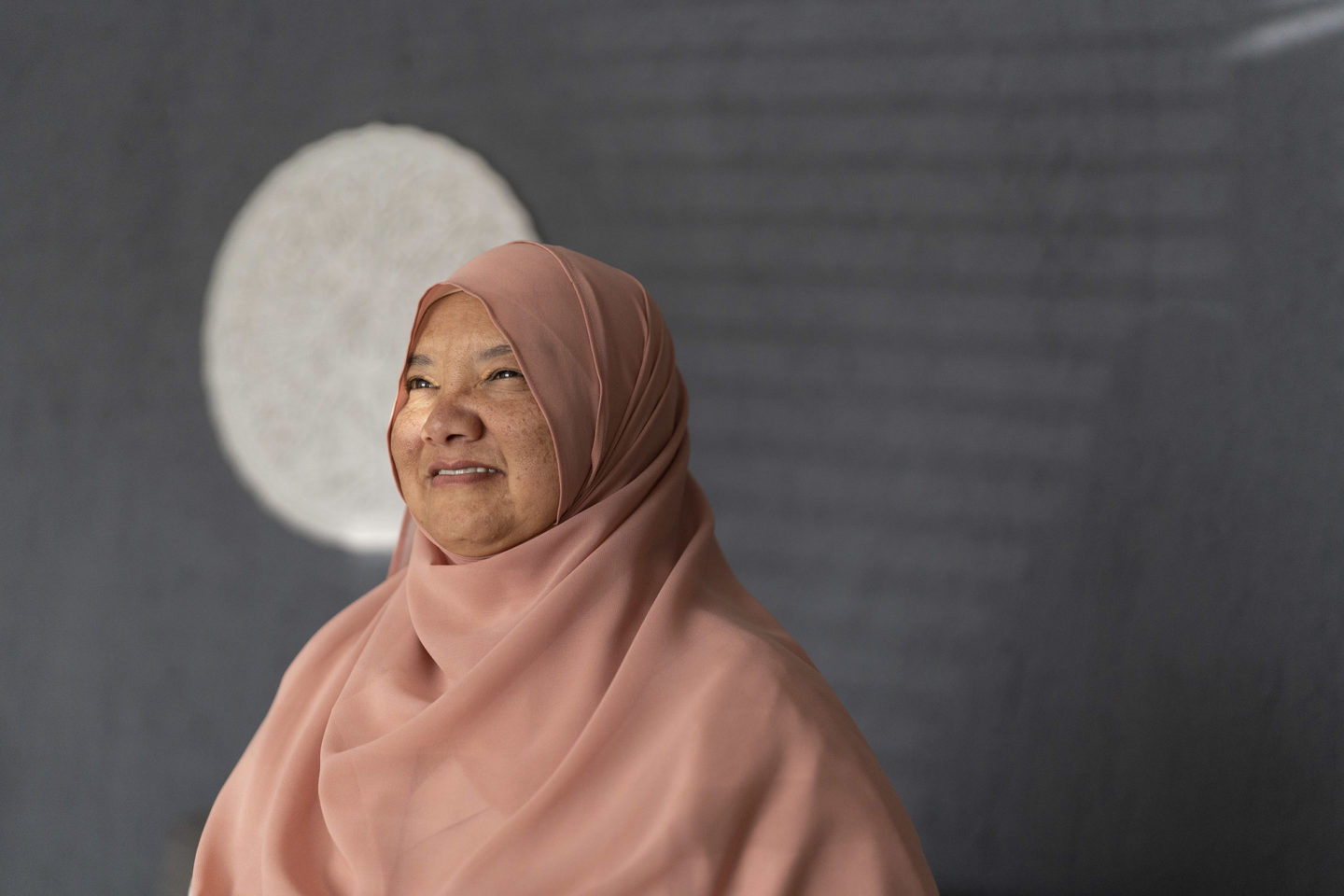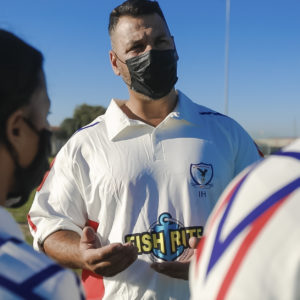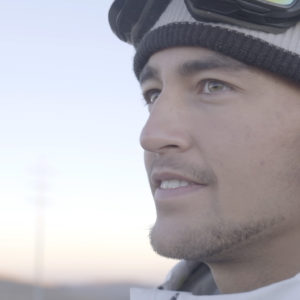It has taken a family to raise Haashim Domingo
The Mamelodi Sundowns player gives all credit for his football success to his beloved mother and father, who have supported him on an arduous journey every single step of the way.
Author:
29 April 2022

To make sure his son made it to football practice on time, Habiel Domingo took an arduous path in 2003. The task of getting to training is taken for granted everywhere except in communities wracked by crime. There’s little adult supervision and opportunity lies far, far away from home. Habiel can tell you all about that.
For five days a week, he would drive 30km from a building site in Hout Bay where he worked and pick up his son Haashim, 8, in Hanover Park. He would then take him to Ajax Cape Town’s base in Parow, a further 20km away, before driving back to Hout Bay to continue his shift. He would return to Parow later that afternoon to fetch the boy and drive back home to Hanover Park, which is 20 minutes and a world away from Cape Town’s gleaming tourist magnets.
Haabil’s drive of about 100km would have taken around two hours, a valuable amount of time to lose for someone working in the fickle construction industry. His sacrifice is what kick-started his son’s football journey, which has spanned two continents and multiple countries. It has also brought Haashim back home to South Africa, where he now plays for Mamelodi Sundowns who secured their fifth successive league title on Wednesday 27 April.

On arriving at the family home with his father after practice, the young Haashim would be “debriefed” by his mother Fatima. The mother of four was a formidable netball player in her day and a promising rugby player, too, before she was forced to stop “because how can a girl play rugby?”, she recalled with a hint of resentment. Fatima would seize upon Haashim’s frustrations and create moments for learning and motivation – essential ingredients for raising a professional sport star. It’s the soft influence that she employed to strike a chord with her young, temperamental boy, who had to deal with disappointment constantly.
“After every game, I had to calm him down. He was never any coach’s blue-eyed boy. He would tell me, ‘Mommy, I’m here to do a job. I’m not here to be the coach’s friend,’” she said.
All in the family
The Domingo family dynamic illustrates that producing successful athletes requires not just working facilities and viable opportunities, but a stable support system and a balanced home life that nurtures and grows talent.
Haashim’s journey through football has taken him to the manicured training grounds of Europe’s elite, but not before it dragged him through the gravel, with an absence of first-team game time and a career-threatening injury when he was still a young player at Ajax.
In a scene from the Oscar-winning King Richard, the biopic of tennis superstars Venus and Serena Williams through the lens of their father Richard, he is confronted by a child services officer threatening to take his girls away from him. Richard defiantly shouts out aloud: “Now I don’t even mind you saying we’re hard on these kids. You know why? ’Cause we are. That’s our job. To keep ’em off these streets.”
Richard, who drew up a 78-page plan for Venus and Serena before they were born, saw sport as a way to save his children from the fate dealt to him and those around him in gang-ridden Compton, Los Angeles.
Related article:
Similarly, the Domingos’ commitment to their son’s sporting career was a way of ushering him to a better life away from Hanover Park, and so supporting him on that path, no matter how long the journey, became the only objective.
Richard bussed in a bunch of children to hurl insults at Venus and Serena while they practised. “In order to be successful, you must prepare for the unexpected,” he explained in a 2015 interview with CNN. “I’m in the champion-raising business,” Richard said in the film.
The Domingos took a different approach. “The one thing that we instilled in Haashim is we’ll support you in what you are passionate about,” Fatima said. “You decide. We will always encourage them to find their strong points. You follow your dream, we support you.”
Multiple influences
On the field, Haashim is a product of Ajax’s youth system, where he spent 11 years from the age of seven. Off the field, he’s a combination of his father’s work ethic and perseverance and his mother’s optimism and belief in his physical abilities. Fatima has a laser focus on Haashim’s mental and emotional state.
“From small, you could just see he stood out among children his age and even older. He used to play with my brother’s friends on the pitch in Hanover Park, literally kicking the ball around. I think I spent more money on takkies than anything else,” Fatima said. “People started noticing his ability when he started trials at Ajax Cape Town. He trialled for an entire year. What amazed me about this boy was during Ramadan, right through, he would still fast because he’s got to be at the trial. So he would fast, go to trials and come back.”
After a tepid start to his Sundowns career in 2020, Haashim’s patience appears to have paid off in 2022. A spectacular dipping strike against TS Galaxy on 2 March signalled the playmaker’s first goal for the Brazilians – a milestone that has been rewarded with more game time this season, including starts in the CAF Champions League.
Haashim scored on his professional debut in 2015 for Portuguese club Vitória Guimarães, which was then in the second division. It was Valentine’s Day but the romance didn’t last. The desire for regular first-team game time led Haashim, now 26, down numerous paths that ended in disappointment and half-chances.
“I never got anything easy in life or my career. For me, fighting my way into something is part of me and my personality. It’s what I know,” he said. “Nothing was put on a silver platter for me. I’m patient, willing to work hard, put in that extra effort and do more than what other guys are doing because I know where I want to be.”
Frustrated but undefeated, Haashim called on his mother, a familiar voice and a source of comfort and wisdom. “I always said to him, just remember if something goes wrong, does that make you a bad player? No. It’s there to make you stronger. So when you get up ready for the next game you need to say to yourself, I want to change that. That is the stuff I used to do all the time: conflict resolution and anger management,” Fatima said.
Hope in a sport
The love for sport was ingrained in Fatima from a young age. Growing up during apartheid, sport was both a distraction from hardship and also a constant reminder of the injustices heaped upon the people of her community.
“I come from the era when we still played what was called board games, where Hanover Park would select their best and we would play against others, and you’d hope someone would look at you,” she said. “We weren’t really as fortunate to be exposed to the official Western Province squad or South African netball squad at the time. I went as far as I could for that time.”
Haashim returned to South Africa in 2018 when Bidvest Wits, the now-defunct Johannesburg club, made him an offer. It wasn’t long before he got the call from Sundowns. Again, he was not the first choice, but he was willing to bide his time. “It’s not about just walking in there. You have to put in the work and prove yourself, so I knew it wasn’t going to be easy. It’s just part of my personality to not give up and grind and work, and eventually things will fall into place,” he explained.

It’s the kind of maturity and patience Haashim has had to learn from a tender age. His mother understood what was required for her son to make it on a tough stage, and she made him aware of how to handle the pressure he put on himself and that got foisted on him.
“My support base is great. I can call them in the middle of the night, they’re always there for me. That’s what we’re lacking in Hanover Park and other communities – the support base. I’ve played with many players whose parents were never at the field and never watched them play,” Haashim said.
“Every Saturday I played, my parents watched me. They were always there. My entire family was there supporting me. That’s something … you look on the side of the field and you see your parents cheering you on and you feel proud. It’s a proud moment for me and I’m sure for them as well. Really, I can’t repay them for what they’ve done for me. That little bit of milk my mother gave … I can’t repay her but I can show her I’m grateful.”
Overcoming adversity
A childhood in Hanover Park comes with little to no guarantees, but the Domingos found ways to overcome persistent challenges placed in their son’s path. Fatima’s guidance through those difficult patches ensured that the youngster stayed focused and didn’t give in to the temptation of giving up as the odds stacked against him. He had to fight.
The family’s roots are still very much in Hanover Park, even though they’ve moved to neighbouring Mount View. Haashim’s new life in Gauteng with a wife and a newborn offers him a perspective on his life so far, and it’s a view he doesn’t need reminding of.
“Growing up wasn’t easy, but there was always food on the table. I can’t say that I went to bed without eating. I have that type of family. It wasn’t easy, but I take my hat off to my family. They really made sure I had food, I had my necessities, and whenever I needed something they made a way for me to get it. I’m grateful for that,” Haashim said.
“He still does what we taught him all these years later,” Fatima said proudly. “If it’s a game night you sleep earlier. Whether you fall asleep or not, you go to bed. I raised a good boy. He still goes to bed early before a game. I said to Haashim, I don’t have money to give you when it comes to materialistic stuff, but I can give you everything else that I have. I can encourage you, I can teach you how to make your own decisions.”
Related article:
The lessons are not lost on the Domingos’ only son, having journeyed through Europe and felt the pain of rejection and major injury. “My mom has always been the one to do the damage control. I’m very hard on myself when I come back from a game and I didn’t feel I did enough on the field. She would always remind me that whatever I think and believe, I can do. She played a huge role along with my father,” Haashim said.
“My father didn’t speak that much, but the way he does things throughout his life pushes me. The hard work he does every day … he comes back tired. That made me see that perseverance and that really pushed me as well. They also instilled the normal morals in me, about being humble and putting God first.”
Haashim is not the only offspring Habiel and Fatima need to think about. Their three daughters have dreams of their own in the fields of medicine, Islamic studies and marine biology, and their parents somehow manage to find the time and strength to support them all.
“People tell me, aunty Fatima, you’ve got a diverse family. And my response is always the same: Don’t worry, I’m the only normal one,” she laughed. “Living in Hanover Park already tells you we are not affluent people. I believe we are rich in health. I believe we are rich in whatever the Almighty has given us and that is satisfactory for us.”


